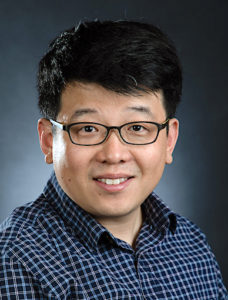Tagged: “forgiveness therapy”
“Forgiveness Pioneer” Wins Inaugural Gold Medal Award for Impact in Psychology
The scientific application of forgiveness, forgiveness education, and forgiveness therapy is being singled out for its “game-changing impact on the field of psychology” by the country’s largest and oldest organization of doctoral-level psychologists.
The American Psychological Foundation (APF), the grant-making arm of the American Psychological Association (APA), has just announced the winner of its first-ever Gold Medal Award for Impact in Psychology—Dr. Robert Enright, a professor of Educational Psychology at the University of Wisconsin-Madison, and founder of the International Forgiveness Institute.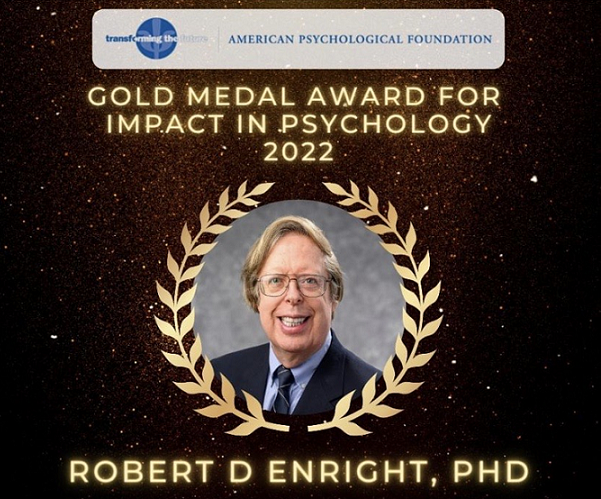
Classified as one of psychology’s highest honors, the award “recognizes a psychologist whose work has had a game-changing impact on the field of psychology,” according to APF board president Terence M. Keane, PhD. He added that the new award acknowledges “a psychologist’s body of work that has been impactful, innovative, and transformational.”
Prior to this year, the award was called the Gold Medal Award for Life Achievement and it has been bestowed on exceptional psychological innovators by the APF for the past 65 years. Previous winners have included B. F. Skinner (the 1971 winner who developed behavior analysis), Harry Harlow (the 1973 winner and a UW-Madison psychologist like Dr. Enright), Rollo May (1987), Mary Ainsworth (1998), and Albert Bandura (2006).
“For the APA and the APF to position forgiveness alongside the creative achievements of those giants in the field of psychology is truly a profound pronouncement,” Dr. Enright said after learning of his recognition.
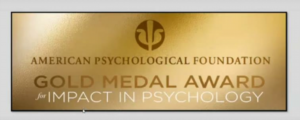 As a grant making foundation, the APF helps fund psychologists and students worldwide who are using psychology to address major issues and improve lives. The APA has more than 133,000 members—doctoral-level researchers, educators, clinicians, consultants, and students (associate members). Combined, the two organizations have more than 500 staff members who focus on providing services to psychologists like Dr. Enright who have dedicated their lives to improving the mental health and welfare of others.
As a grant making foundation, the APF helps fund psychologists and students worldwide who are using psychology to address major issues and improve lives. The APA has more than 133,000 members—doctoral-level researchers, educators, clinicians, consultants, and students (associate members). Combined, the two organizations have more than 500 staff members who focus on providing services to psychologists like Dr. Enright who have dedicated their lives to improving the mental health and welfare of others.
Dr. Enright, a licensed psychologist, has devoted 37 years to the scientific study of forgiveness. As the unquestioned pioneer in the field of forgiveness, Dr. Enright published the first social scientific journal article on person-to-person forgiveness and the first cross-cultural studies of interpersonal forgiveness. He also pioneered forgiveness therapy and developed an early intervention to promote forgiveness–the 20-step “Process Model of Forgiving.”
The Enright Forgiveness Inventory (EFI), an objective measure of the degree to which research participants forgive another who has been unjust and hurtful toward them, is now used by researchers around the world. The Enright Forgiveness Inventory for Children (EFI-C), the Enright Self-Forgiveness Inventory (ESF-I), and the Enright Group Forgiveness Inventory (EGFI) have all become standard research tools known simply by their abbreviations.
Dr. Enright also pioneered the use of forgiveness therapy in clinical practice by developing 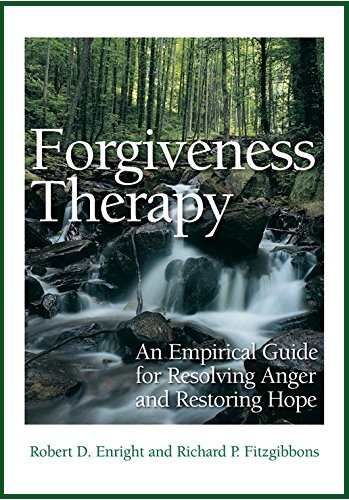 interventions that gained critical acclaim with the APA’s publishing in 2015 of Forgiveness Therapy, an instructional manual for clinicians written by Dr. Enright and psychiatrist Richard Fitzgibbons, MD. The two authors were selected in 2019 as recipients of the prestigious Expanded Reason Award presented by the University Francisco de Vitoria (Madrid, Spain) in collaboration with the Vatican Foundation Joseph Ratzinger/Benedict XVI (Rome, Italy) “to recognize and encourage innovation in scientific research and academic programs.”
interventions that gained critical acclaim with the APA’s publishing in 2015 of Forgiveness Therapy, an instructional manual for clinicians written by Dr. Enright and psychiatrist Richard Fitzgibbons, MD. The two authors were selected in 2019 as recipients of the prestigious Expanded Reason Award presented by the University Francisco de Vitoria (Madrid, Spain) in collaboration with the Vatican Foundation Joseph Ratzinger/Benedict XVI (Rome, Italy) “to recognize and encourage innovation in scientific research and academic programs.”
Dr. Enright’s ambitious approach to forgiveness education included the development of 14 Forgiveness Education Curriculum Guides for students in grades Pre-K through 12th. Through stories, children learn about the five moral qualities most important to forgiving another person–inherent worth, moral love, kindness, respect and generosity—and eventually, how they themselves can become a forgiving person.
A just-completed meta-analysis by University of Wisconsin-Madison researchers involving more than 1,500 students in 10 countries shows that students enrolled in Forgiveness Education Programs demonstrated reduced anger and increased forgiveness toward those who have hurt them. Those forgiveness guide lesson plans, distributed through the IFI, have been requested by educators in more than 30 countries and contentious regions around the world.
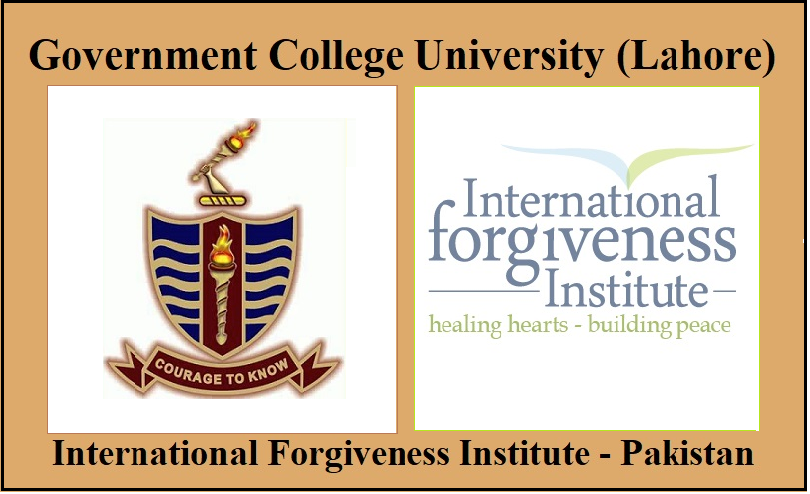 Adding to its forgiveness education agreements with many of those countries, the IFI’s newest Branch Office is IFI-Pakistan, a partnership with the Government College University Lahore, Lahore, Pakistan–the first in that country and in Southern Asia. In Greece the IFI has trained more than 600 grade school instructors in the past 8 years who are now teaching forgiveness to more than 6,000 Greek students.
Adding to its forgiveness education agreements with many of those countries, the IFI’s newest Branch Office is IFI-Pakistan, a partnership with the Government College University Lahore, Lahore, Pakistan–the first in that country and in Southern Asia. In Greece the IFI has trained more than 600 grade school instructors in the past 8 years who are now teaching forgiveness to more than 6,000 Greek students.
“Although the virtue of forgiveness has made astronomical strides in the past few decades, we are just on the edge of what it can offer us for the future,” Dr. Enright says. “Forgiveness must have a seat at the peace-keeping and peace-making table.”
According to Dr. Enright, his body of work has clearly demonstrated that as people forgive, they become less angry, less depressed, less anxious, and more hopeful of their future. In other words, people become more peaceful within themselves, making the possibility of peace with others more likely.
Dr. Enright has outlined his grass-roots approach to peace through a variety of forums beginning with his 2010 article “Forgiveness Education as a Path to Peace,” his 2014 address to the United Nations Population Fund “Forgiveness as a Peace Tool,” and his recent series of 3 essays on peace published on the Psychology Today digital website.
In 2015, Dr. Enright accompanied Eva Mozes Kor, a survivor of the Holocaust, on a series of US radio interviews to promote peace through forgiveness. His peace initiatives have earned him peace educator awards including being named a Paul Harris Fellow by Rotary International in 2016.
Time magazine has called Dr. Enright “the forgiveness trailblazer.” The Los Angeles Times said Dr. Enright is “the guru of what many are calling a new science of forgiveness.” The Christian Science Monitor called Dr. Enright “the father of forgiveness research.”
As the recipient of the 2022 Gold Medal Award for Impact in Psychology, Dr. Enright will be honored during APA 2022–the annual American Psychological Association convention on August 5th in Minneapolis, MN. He will receive a gold medal plaque and a modest honorarium during the APF Friends of the Foundation reception.
You emphasize anger in your forgiveness model. Yet, I am not feeling anger. I am feeling pain. Might you have missed this in your model?
I agree with you that pain occurs after being treated unjustly. I think the sequence is as follows: 1) Someone is unfair to you; 2) Next comes shock or even denial; 3) Then comes pain, as you describe; 4) If the pain does not lessen or if you have no effective way of reducing and eliminating the pain, then you may become angry.
That anger can be at the person for acting unfairly, or at the situation, or even at the pain itself that resulted from the unfair treatment. It is the anger, if it abides and deepens, that can lead to health problems (fatigue, anxiety, and so forth). So, I emphasize anger within Forgiveness Therapy because it, in the form of excessive anger or resentment, can be dangerous to health, relationships, and communities.
Correcting Forgiveness Misconceptions and Distortions
Misconceptions and distortions are nothing new to most professionals—particularly to the professionals who employ forgiveness interventions and forgiveness therapy. Since the first empirically based study on person-to-person forgiveness was published in the social sciences (Enright et al., 1989), there has been vigorous debate on exactly what forgiveness is and is not.
That debate has generally been positive and helpful in the overall evolution of forgiveness from a simple concept (and primarily a religious credo) to a vitally important mental health approach for many people who have been victimized. At the same time, there still are a few in the mental health professions who are criticizing forgiveness with some good points but also with some errors.
Those who dispense misinformation about forgiveness prevent many individuals from
choosing forgiveness when they could truly benefit from deep emotional recovery.
Dr. Robert Enright
Dr. Enright, co-founder of the International Forgiveness Institute (IFI) and the man labeled “the forgiveness trailblazer” by Time magazine, has been using scientific research methods to study forgiveness for more than 35 years. Whenever he learns about an inaccurate or erroneous premise that is being circulated, he tries to address it head-on. That’s exactly what he did just this week by factually countering an essay published on Feb. 20 in Psychology Today.
The essay, “Why Forgiveness Isn’t Required in Trauma Recovery,” was written by a Chicago psychotherapist who is also a speaker and author. While acknowledging that “I’ve witnessed the benefits of forgiveness for many of my clients,” the author’s main contention is that “forgiveness is potentially problematic when incorporated into trauma treatment.”
While Dr. Enright says he has heard all those erroneous assertions before, he quickly drafted his own essay providing fact-based and true-to-life counter arguments for each of the claims. His goal in doing so, he says, was not to heavily criticize, but instead “to protect the integrity of a genuine process of forgiveness, free of confusions of what forgiveness is and is not.”
Dr. Enright’s critique of the original essay was published on Feb. 26 by Psychology Today. While the publication gave his clarifying discourse the same title as the original Feb. 20 article, it added a significant subtitle, “Why Forgiveness Isn’t Required in Trauma Recovery: Published misconceptions of forgiveness may discourage people from trying it.”
The blog essay by “the father of forgiveness research” (the title bestowed on Dr. Enright by The Christian Science Monitor) provides 5 succinct and factual responses to the original article’s 5 contentions. It also clarifies two points on which he agrees with the article: 1) “forgiveness after unjust behaviors is not necessarily for everyone;” and, 2) “as a moral virtue, forgiveness never ever should be forced onto anyone.”
Dr. Enright is no stranger to Psychology Today. In fact, in the past 5 years he has penned nearly 100 blog essays as part of his own dedicated column for the publication’s website called “The Forgiving Life.” Those blog posts have been accessed online more than a million times–an average of 548 times per day since he began writing them.
According to Dr. Enright, he will continue his efforts to provide information to Psychology Today readers and he will continue to clarify points when there appear to be misunderstandings about forgiveness and forgiveness therapy so that both therapists and clients can make informed decisions.
LEARN MORE:
- Read the original article: “Why Forgiveness Isn’t Required in Trauma Recovery”
- Read Dr. Enright’s critique of that article: “Published Misconceptions of Forgiveness May Discourage People from Trying It”
- View Dr. Enright’s “Top Ten Psychology Today Blogs”
- Access all of Dr. Enright’s “Psychology Today Blogs“
Forgiveness Education for Students in Nursing Program Helps Reduce Anxiety and Depression
A research study published last month, utilizing Dr. Robert Enright’s forgiveness intervention model, showed that students in college nursing programs would benefit from a forgiveness intervention in the areas of self-care and forgiveness facilitation.
The nursing students, randomly assigned to either an experimental group or a no-contact control group, used Dr. Enright’s book 8 Keys to Forgiveness as the project’s treatment manual. After studying one chapter a week for 8 weeks, the students in the experimental group showed greater improvement in forgiveness compared to those in the control group from the pretest to the posttest which was maintained at the four-week follow-up. In addition, those in the experimental group showed statistically significant decreases in anxiety, depression, and fatigue from pre-testing to both post-testing and follow-up testing periods.
The study was conducted by a team of 8 researchers from the Liberty University School of Nursing (Lynchburg, VA) under the direction of Jichan J. Kim, Associate Professor of Psychology at Liberty. Dr. Kim has been the lead investigator on more than a dozen forgiveness-related studies over the past several years.
This latest study, The Efficacy of a Forgiveness Bibliotherapy: A Randomized Controlled Trial with Nursing Students, was published in the Journal of Holistic Nursing (JHN) on Jan. 10, 2022. JHN is a peer-reviewed quarterly journal with a focus on advancing the science and practice of holistic nursing and healthcare.
“The need for forgiveness education for nursing students has risen dramatically as responsibilities have broadened for nursing professionals,” according to Dr. Kim. “Our study positively demonstrated that the use of bibliotherapy can be a cost-effective way to promote the virtue of forgiveness for nursing students who are likely to be in need of exercising self-care and would have opportunities to facilitate forgiveness for their patients.”
Bibliotherapy, Dr. Kim explained, is a therapeutic approach that uses literature (in this case Dr. Enright’s 8 Keys to Forgiveness) to support good mental health. This study, he added, demonstrated not only the effects of forgiveness, as numerous studies have done in the past, but also the feasibility of using a forgiveness bibliotherapy that can be easily adopted into the existing nursing curriculum.
That same approach has been used by Dr. Enright, co-founder of the International Forgiveness Institute (IFI) and the man Time magazine calls “the forgiveness trailblazer,” in a slightly different format over the past two years. Dr. Enright has worked with Dr. Chontay Taylor Glenn, PhD, RN, PMHNP-BC, to enroll a total of eight University of Michigan-Flint nursing students in the IFI’s Forgiveness Therapy training course.
Dr. Glenn is Assistant Professor & Project Director of the Psychiatric Mental Health Nurse Practitioner Residency Program at UM-Flint. In addition to incorporating the IFI’s forgiveness training into the curricula for her nursing students, she also developed a program through which nine Flint-area community counselors completed the Forgiveness Therapy online continuing education course. Dr. Kim provided three hour-long training sessions by Zoom as part of that collaborative effort between Dr. Glenn, Dr. Enright, and himself.
The newly trained counselors in Flint are also undertaking an expanded role in their community, according to Dr. Glenn–providing forgiveness education classes and case coordination to Flint-area adolescents who have experienced adverse childhood experiences. The project is funded by a grant from the W.K. Kellogg Foundation in Battle Creek, MI.
About Dr. Kim
Jichan J. Kim is an Associate Professor of Psychology and the Director of the M.A. in Applied Psychology program at Liberty University, Lynchburg, VA. His research interests include the effects of interpersonal and intrapersonal forgiveness as well as the integration of psychology and Christianity.
Dr. Kim has degrees from the University of Wisconsin-Madison (M.S. & Ph.D.), Harvard University (Ed.M.), Gordon-Conwell Theological Seminary (M.Div. & M.A.), and City College of New York (B.A.). He also has extensive ministry experience in New York City, Boston, and Madison (WI), serving various age groups in Korean immigrant congregations.
Learn More:
- Nursing Students Research Report Abstract
- Bibliotherapy Defined
- Overview of the IFI’s Forgiveness Therapy Course
How does the issue of repressed memory fit into the forgiveness process? In other words, if I cannot remember abuse against me from my childhood, then how can I even consider the forgiveness process?
Repression is a defense against being overwhelmed by our feelings. This can be a protection for our mental health, at least in the short run. Yet, if the repression is so strong as to prevent an awareness of past trauma, so that the trauma cannot be uncovered and healed, then it can work against one’s psychological well-being. A key issue is this: Trauma that is deep and not uncovered can lead to symptoms in the present such as a lack of trust in others and/or anxiety. If a person presents with such issue of mistrust or anxiety, it can be helpful first to let the person know that there is a scientifically-supported approach to confronting any past trauma, if this happened in the person’s life, and experiencing healing from that trauma. That approach is Forgiveness Therapy. This can help people let down their psychological defenses, which then can lead to insight from the past, and this then can be the beginning of psychological healing through forgiveness, if the person chooses to forgive.

